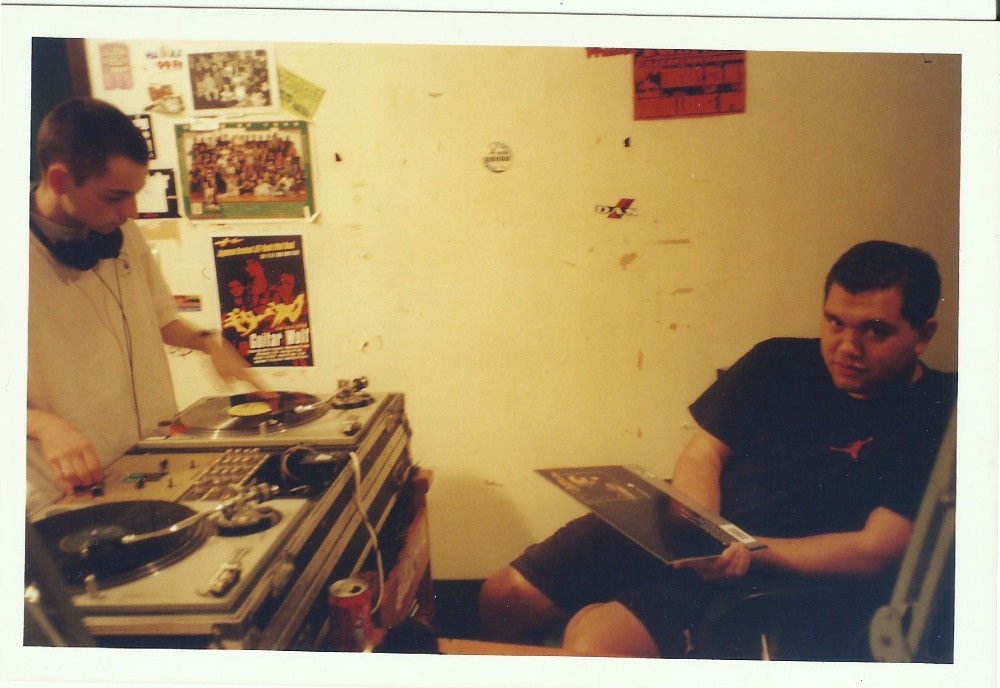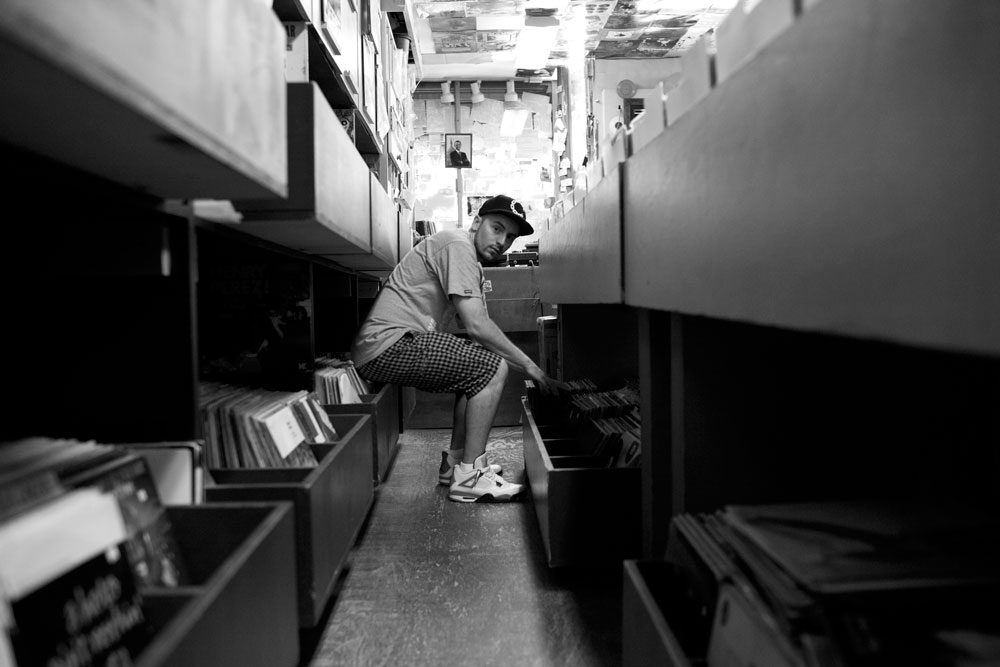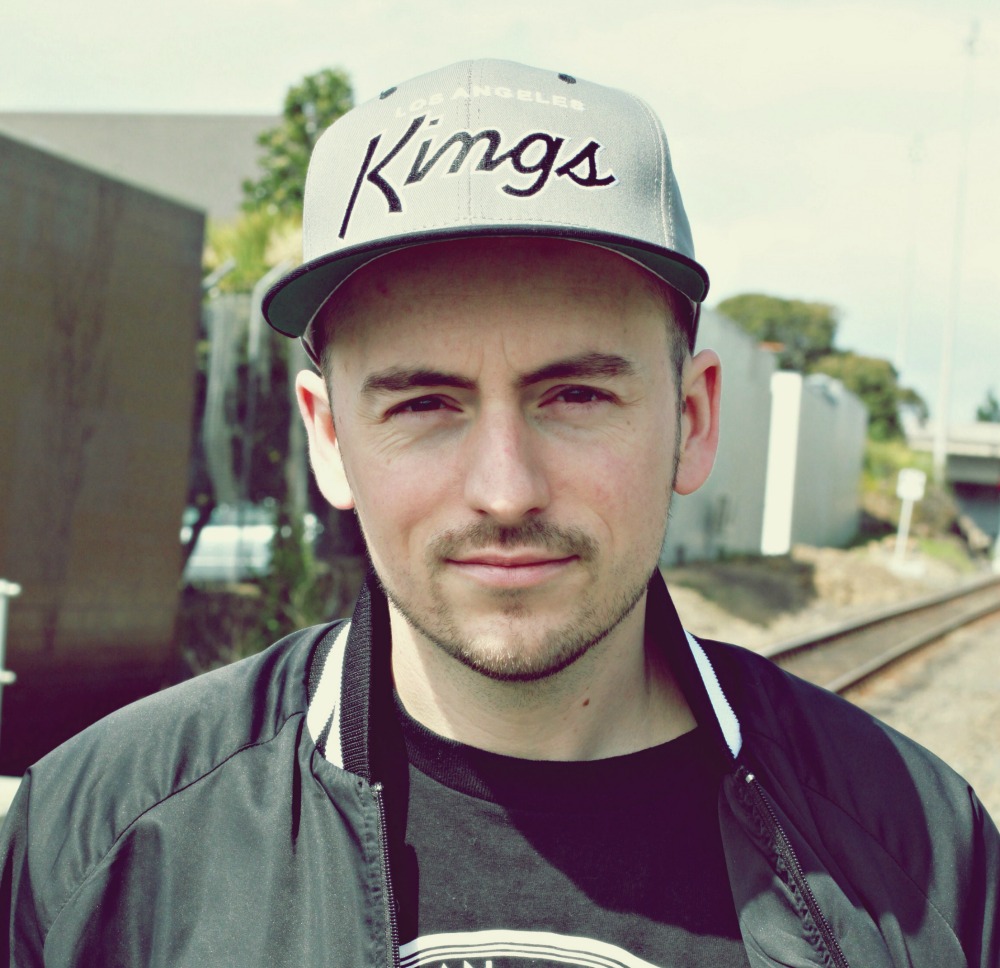In October 2002, Peter Wadams, better known as P-Money, flew to New York to embark on the next phase of his music career. Over the five years prior, the Auckland-based DJ and record producer had played an instrumental role in the rise of New Zealand hip-hop. He’d gone from a fresh-faced teenage beat maker and DJ to placing third at the 2001 Technics DMC World DJ Championships in London. P-Money had also scored production credits on Che Fu’s chart-topping album The Navigator, and with the release of his debut album Big Things, helped push a new generation of New Zealand rappers like Scribe, 4 Corners, and Deceptikonz into the spotlight.
“I had some friends in a Christian rock band that had been signed by an American A&R,” P-Money recalls. “He called me and told me he’d played my record to some people in the know with hip-hop. He wanted to get me over to New York, sign me as a producer, and get me working.” It sounded like the big break P-Money had been dreaming of, but his enthusiasm was measured.
Videos by VICE
Ex-pat New York music industry insider Kirk Harding suggested he come over and check things out. “Long story short, the guy didn’t have things going on like he had expressed them to me,” he admits. “Kirk had me take the contract to Loud Records, who gave me some free advice about some side points to ask for. I went back to them, and they were like, no way! You’re a nobody from New Zealand. You think you can have the best deal in the world? Get the fuck out of here!” P-Money was devastated. Before leaving, he’d handed his radio and TV shows over to peers, and told his friends and family he was moving to America. He couldn’t just go home.
“Kirk told me to come crash at his crib and let him help me figure it out,” he remembers. “I said, I just want to make beats.” Kirk made a couple of calls. He asked his friend B-Side – a rising hip-hop A&R – to take him on as a roommate, and sent P-Money to meet with a producer named Sean C at his studio in Harlem. “B-Side said, here’s the couch for $100, and I said, sweet,” P-Money laughs. “Next thing I had an apartment on 123rd Street, and Sean’s studio was on 113th Street.”

4 Corners, Scribe and P-Money, Kog Studios 2002

DMC World Championships, London 2001
Sean C and his friend LV had established a production company called Grind Music. Sean had acted as an A&R and producer for the likes of Big Pun, Dead Prez, and Mobb Deep. Grind Music was on a trajectory that would see them working alongside Puff Daddy on production for Jay-Z’s 2007 album American Gangster. Every day, P-Money would walk to the studio, play Sean and LV beats he’d made the night before, and record songs with rappers who came through the studio like Bobby Creekwater and Aasim. He’d also chop it up with respected DJ’s like Roc Raida and Boogie Blind. “I was in the studio with those guys every day for the next few months,” he recalls. “I made a lot of work friends who are connections to this day during that time.”

With Sirvere at BFM 1999
P-Money had always thought New York hip-hop producers had something special that gave them their sound. Quickly, he realised they were using the same gear. They were just working harder than what he’d experienced in New Zealand. “It took all of the ideas I had about limits out of my mind,” he says. “There was no reason my music shouldn’t be at that level.” The friendly competition in the studio pushed him. “It was a really important trip and probably the most important part of my story as far as it relates to music production.”

Wellington DJ Battle, 1998
Halfway through 2004, P-Money headed overseas on another trip. This time he was traveling to the UK with Scribe. After returning home at the start of 2003, P-Money teamed up with South Island beat makers Ali and Shan to flesh out Scribe’s debut album The Crusader. The album and its anthemic singles were a huge success on both sides of the Tasman and turned Scribe into one of the biggest Pacific stars of the mid-2000s. The momentum this built gave them a platform to begin introducing a new wave of local rap talent including David Dallas (formerly Con Psy of Frontline) and PNC to their growing audience.
“We’d made some money in New Zealand and Australia, so we could reinvest in getting into the UK market,” P-Money recalls. They rented out an apartment, set-up shop, and started playing live shows and going on press runs. The UK industry and audience loved their work, in particular, the music video for “Not Many – The Remix!” Soon they were sharing stages with Rodney P & DJ Skitz and Roots Manuva, and scoring video play on Channel U. “We had a publicist named Chris Rock, obviously he wasn’t the comedian,” he continues. “He got us everywhere. We went on all the pirate radio stations, did the biggest stations, and talked to everyone.”
Scribe and P-Money visited the UK several times, building a legacy that sees them remembered there to this day. “When I met Mike Skinner from The Streets, he told me they loved “Not Many” back in the day and always used to request it,” P-Money recalls. “The more time goes on, the more I’m glad we put the work in over there.”
That same year, P-Money returned to New York to complete his second album Magic City. “By this stage, I felt like I’d done my bit for New Zealand hip-hop and wanted to see if I could make a record with American rappers I respected,” he explains. Despite his success with Scribe; commercial realities meant he’d have to find artists willing work with him and his budget. With A&R assistance from B-Side, he recorded with Capone (of Capone-N-Noreaga), Sauce Money, his old friends Aasim and Bobby Creekwater, and a pre-fame Akon on “Keep On Calling.”
The album and its singles achieved commercial success in New Zealand and Australia. However, the most significant part of this trip was who he brought with him. “I was there for two weeks, and David Dallas came with me,” he says. “He was quiet as a mouse, and he observed it all. Part of his story is those experiences set him up for what he did for his career. He got to watch me make Magic City, meet some industry people, soak up all that game, then apply it in such a different way with his own vision.”
In 2009, these experiences started paying creative dividends when P-Money, David Dallas, David’s manager/DJ Che Kamikaze, 41 (David’s Frontline producer) and a new Auckland production duo named Fire & Ice started working to launch David internationally. P-Money had spent the last couple of years making dance music, scored a #1 hit in New Zealand with “Everything” feat Vince Harder, and released Scribe’s second album Rhyme Book. David had done the group thing with Frontline, before reincarnating himself under his birth name. He was the next wave, and P-Money was excited.

Image: Alexander Richter
“We should draw a line in the sand here,” P-Money says. “Before 2008 was the traditional music industry. After 2008 was when this whole internet thing kicked into how we were marketing and trying to reach audiences overseas.” David’s manager was fascinated by Internet marketing, so they were early adopters. David wanted a strong visual look and a relaxed musical feel. They started filming striking videos with Special Problems director Joel Kefali and the visual for “Big Time” landed on Kanye West’s blog. Soon it was popping up on other hip-hop blogs, while David and Che networked with the bloggers. Meanwhile, P-Money worked towards the release of his dance album Everything in 2010, spending some time in the UK along the way. “‘Everything’ got some spins on 1Xtra and BBC Music,” he remembers. “I did a DJ tour with Zane Lowe; then I came home.”
After David’s album Something Awesome sold around 2,000 copies domestically in 2009, he decided he wanted to put his next album out for free download. When The Rose Tint dropped in 2011, it was off the back of several yearly visits to the US to perform at new music festival SXSW in Austin, Texas, and strong online support within the hip-hop blogosphere of the era. They clocked over 50,000 downloads of The Rose Tint worldwide. “Now we had a global thing going on; it was a different story,” P-Money says.
In the lead-in to this moment, P-Money and his business partners in independent label Dirty Records merged with Dawn Raid Entertainment and a couple of other local music companies to form Frequency Media Group. P-Money had worked with Dawn Raid and their artists on-and-off since early in his career. Dawn Raid was riding high on the massive success of Savage’s single “Swing” in the US, and they were able to connect P-Money and David with seminal New York hip-hop label and management company Duckdown Music. What started as promotion and distribution deal turned into them signing with Duckdown. “We relocated to New York to promote Dave’s music,” P-Money says. “We did nine months in Harlem. Almost ten years later we were back in those same streets I was in with Sean C, but his time it was me, Dave, and Dave’s partner Lani in the flat.”
David recorded with a bunch of US rappers like Freddie Gibbs, Tayyib Ali, and The Kid Daytona. They filmed videos in Los Angeles and New York, played spot dates alongside Just Blaze and Pharoahe Monch, and worked the US media circuit. “Caught In A Daze,” David’s collaboration with Freddie Gibbs, was featured in hip-hop and R&B music video show 106 and Park’s new artist section. While they were promoting David’s music in the states, P-Money ended up going on the road and doing some shows with Savage in California, Utah, and Oregon. “It gets a bit blurry, but we had a great time,” he recalls. “Savage was going these crazy things, and people back home didn’t even know what he was accomplishing.”
Duckdown took a shine to P-Money’s production and asked him to record an album with their flagship rapper and co-founder Buckshot (of Boot Camp Clik and Black Moon). It wasn’t a quick process, so he started recording towards his next album Gratitude. “In 2004, everyone I had wanted to work with in the US wanted $20,000 to $30,000 a feature,” he says. “This time around, everyone was a lot more reasonable. They were down to work, and we had real conversations. Next thing you know, I was in the studio with M.O.P!” Aside from the ‘Ante Up’ rappers, he scored features from the likes of Talib Kweli, Roc Marciano, Fashawn, Nicole Wray and Skyzoo. Gratitude and Backpack Travels (his album with Buckshot) came out in 2013 and 2014 respectively.
Halfway through 2012, P-Money, David Dallas and Fire and Ice headed out on a 23-date tour of the US and Canada alongside alternative hip-hop duo Aer and solo artist Yonas. Although in general, David has a good reception in the US some placed him in the white boy frat rap lane established by people like Mac Miller. “There is a whole scene of those guys, and some of them can tour all of America through hitting college campuses. Dave was really resistant to this. His musical reference points are people like Jay-Z, so he didn’t relate to that scene.”
“In New Zealand, we know what it means to be of mixed heritage, and what a Polynesian person is,” he continues. In America, they didn’t know what to make of him. Time and time again, it came up that they saw him as a white boy rapper and wanted him to go in that box. That’s America’s very bipolar view of the world. They don’t really fuck with in between. You’re black, or you’re white. In the end, a call was made, and he had to get on the road. It was a case of, you’re gonna do what you do, your music to these fans, and maybe at the end half of those fans will be your fans. It was weird and awkward, but super fun.” Late in 2013, David released his third solo album Falling Into Place. One of the singles, “Runnin” was featured in the soundtrack of football video game FIFA 14 and went platinum in New Zealand.
In recent years, P-Money has been happily watching the local rise of hip-hop collectives like Tom Scott’s Young, Gifted & Broke and Raiza Biza’s Ammo Nation. He’s also connected with a multicultural new generation of beat makers and producers from around the country including SmokeyGotBeatz, Troy Samuela, T1R, Haan 808, and Montell2099. Although they operate within the current beats and trap music paradigms, he considers them to be part of the same New Zealand hip-hop family tree that connects him to Che Fu, and Che Fu to scene pioneers like Dam Native and Upper Hutt Posse. “These cats all have varying amounts of hip-hop in their DNA,” he explains. “Whether they’re hip-hop fans or not, they tend to reference a lot of rap shit in their music. I’m about 18 years older than most of them. When I talk to them, they say, I remember your stuff. They saw what happened with us, took that as inspiration, but veered off in a different direction.”

With SmokeyGotBeatz scoring production placements with Jay Rock, Kendrick Lamar and Hitboy, and Troy Samuela and Montell2099 making headway within the Los Angeles-centered Soulection scene, P-Money sees these young talents as crucial to whatever comes next for New Zealand hip-hop. “I fuck with their scene man,” he enthuses. “It’s a real melting pot. Their energy reminds me of my youth and our early accomplishments, but there are so many more of them. When I started out, I didn’t really have producer peers apart from Ali in Christchurch and Shan in Dunedin. It was awhile before I felt like I had peers in my city who were making dope beats and doing music of the same caliber. Now I feel like there are heaps of them, they come up every day. These internet-era guys’ music and releases are amazing.”
Nov 21 – 27 is NOISEY New Zealand Hip-Hop Week. Head here for more NZ Hip-Hop content.
More
From VICE
-

Photo: Francesco Prandoni/Getty Images -

Photo: Ethan Miller/Getty Images -

(Photo by Niels van Iperen/Getty Images) -

Erika Goldring/Getty Images
